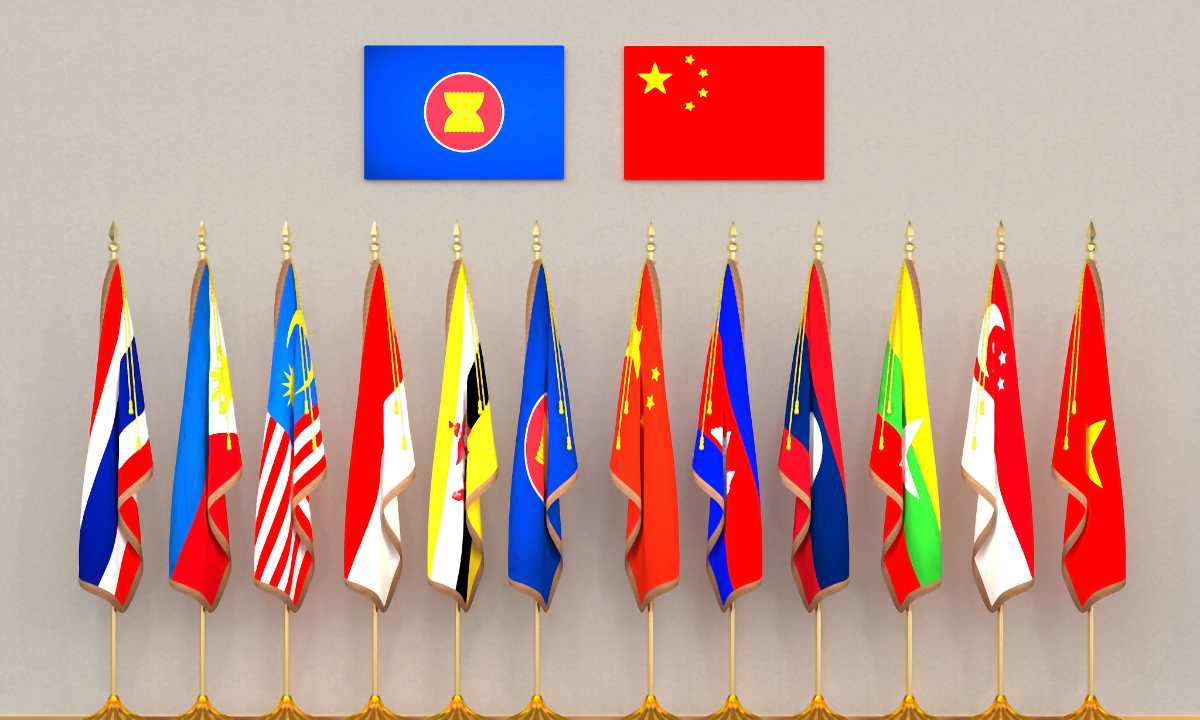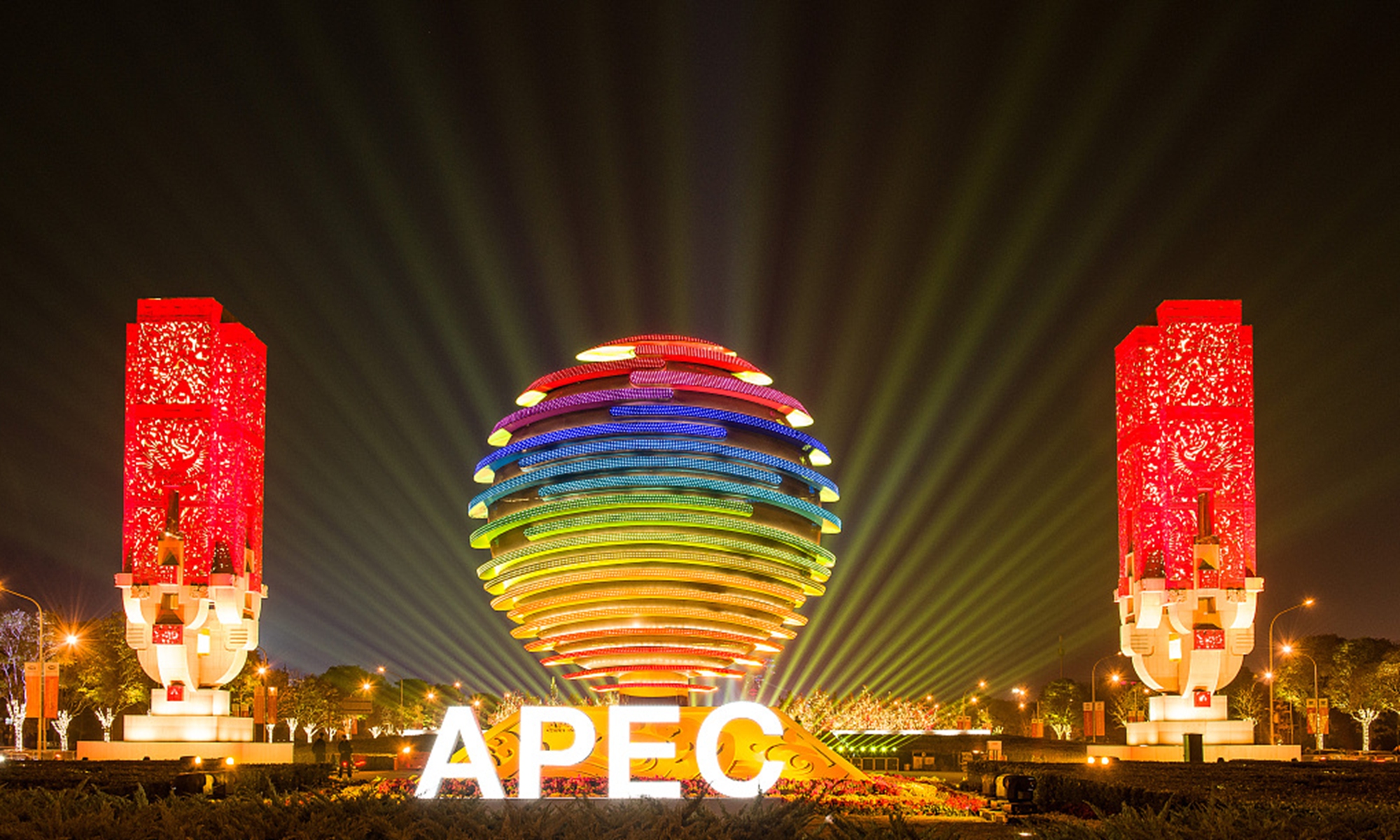
China ASEAN Photo:VCG
For the next few days, the world's attention will shift toward Southeast Asia, where countries are scheduled to host three major international and regional summits. They are trying to seek solutions and consensus amid growing geopolitical turbulence and the long-lasting impact of COVID-19. As the "Asian moment" starts, with the ASEAN summit, G20 and APEC meetings kicking off one after another, China is expected to continue advocating for multilateralism, free trade and a higher level of globalization in the face of mounting challenges, further deepen cooperation with developing countries and play the role of stabilizer in regional and global affairs, experts said.
The ASEAN Summits and a series of leaders' meetings on East Asia cooperation are taking place in Phnom Penh, Cambodia from Tuesday to November 13, which will be followed by the G20 summit that is scheduled to be held in Bali, Indonesia from November 15 to 16.
Soon afterward, the Asia-Pacific Economic Cooperation (APEC) summit will be held in Bangkok, Thailand from November 18 to 19.
US President Joe Biden began a weeklong trip on Thursday, first to Egypt to attend the ongoing COP27 and then to Cambodia for ASEAN and East Asia Summit meetings from November 12 to 13, before joining the gathering of G20, Reuters reported on Thursday.
Biden told reporters on Wednesday that his goal is to get a deeper understanding of China's priorities and concerns in a meeting with the Chinese side on the sidelines of the G20 summit, hoping to lay out "what each of our red lines are," according to Reuters. The US President also said he will discuss the Taiwan question during the meeting.
Zhao Lijian, spokesperson of the Chinese Foreign Ministry, told a routine press conference on Thursday that Chinese and US heads of state remain in frequent communication through various channels. China attaches importance to the US proposal for the meeting between the two top leaders at the upcoming G20 summit in Bali. "The two sides are communicating on the matter," he said.
The Taiwan question is the core of China's core interests, and the one-China principle is the political foundation of China-US relations. The three joint communiqués are the most important guardrail for China-US relations, Zhao noted.
"The US should stop blurring, hollowing out and distorting the one-China principle, and it should respect other countries' sovereignty and territorial integrity in accordance with international relations standards of non-interference," Zhao noted.
As the world's second-largest economy, the largest BRICS country and the largest developing country, China could serve as a bridge and a connection between G7, BRICS countries and medium-sized countries in order to coordinate positions, especially when Russian President Vladimir Putin would reportedly not attend the G20 summit in person, as some media outlets have reported, and China will play a crucial role if any agreement is to be achieved, experts said.
G20 focuses on global economic governance, and the global economy is currently grappling with surging inflation, rising protectionism and ideology-driven decoupling, Wang Yiwei, director of the Institute of International Affairs at the Renmin University of China, told the Global Times on Thursday.
"Another major role of China is to make G20 be G20, and not let each and every topic be hijacked by the Russia-Ukraine conflict," Wang said. It should not blame the conflict for all crises including energy woes and surging inflation, as the protectionism and disruption of supply chain led by developed countries has seriously damaged market laws and hurt growth momentum, he said.

APEC File photo:VCG
China's indispensable roleUnder the theme "Recover Together, Recover Stronger," Indonesia will host the G20 summit as the world finds itself in another multidimensional crisis due to the COVID-19 pandemic, and the upcoming summit will mainly focus on strengthening global health architecture, digital transformation and energy transition, according to the Indonesian Ministry of Foreign Affairs.
It's believed that China will continue promoting its Global Development Initiative in advocating free trade, multilateralism and globalization, Li Haidong, a professor from the Institute of International Relations at the China Foreign Affairs University, told the Global Times on Thursday.
"On economic issues, we advocate globalization, while the economic benefits for different countries should be distributed in a more balanced way, especially for developing countries and emerging economies," he said. On both G20 and APEC, China will continue playing a leading role in forging closer cooperation with developing economies and serving as a stabilizing force in handling regional and global affairs, Li said.
While the world puts much more attention on major powers such as Russia, China and the US and on the possible face-to-face gatherings of the world leaders ̶ a rare event since the pandemic began, some US allies are seeking to interact with China during the upcoming meetings. It also shows that China has an indispensable role in global affairs and in global economic recovery, and be it Japan, Germany or even the US, they need to enhance cooperation with China in some sectors given the highly integrated nature of global supply chains, some experts said.
Japanese Prime Minister Fumio Kishida plans to hold talks with Chinese leader in mid-November on the sidelines of an international gathering in Southeast Asia, Kyodo News reported on Monday, citing diplomatic sources. If realized, it would be the first summit between the leaders of Japan and China since December 2019, the media report said.
It came after German Chancellor Olaf Scholz's recent visit to Beijing where the leaders of Germany and China agreed on enhancing cooperation and maintaining dialogue, rejecting "decoupling" and bloc confrontation, and vowed to further expand cooperation beyond traditional areas.
Meanwhile, US National Security Adviser Jake Sullivan said on Monday that the US wants to get the military-to-military communication between China and the US "back on track," which he said can "help create more stability and reduce the risk of misunderstanding," according to media reports.
As China is at a core position in globalization, more Western countries have realized that regardless of whether it's about business or politics, they need have a pragmatic attitude to cooperate with China, Li noted. "More countries also realize that cooperating with China also means exploring more coordination space and grabbing more opportunities," he said.
China's huge market and whole-industry supply chain are irreplaceable, and its high-quality development brings huge benefits for the world. "Leaving the Chinese market could mean losing global competitiveness," Wang said. Also, Japan, Europe and the US remain competitors at certain levels, and Germany's enhanced cooperation with China will result in certain shockwaves among some other Western countries, he said.
Possible China-US interaction? Some believe that the possible high-level interaction between China and the US could be an opportunity for easing tensions between the two largest economies, but some Chinese experts said that Washington is sending out confusing signals. The US leader claimed that he is not seeking conflict with China, but the White House has not made efforts to prevent the ongoing confrontation from derailing into a dangerous area, they said.
Also, the outcome of the political battle for control of the US Congress is expected to affect the tone of Biden's approach toward China over the next two years, some US media reported.
"The US is trying to send out a signal of easing tensions with China, but it might not be its true intention," Li said. The internal political reshuffle makes it almost impossible to ease tensions with China, but the US needs to show its "responsible attitude" as a major power by delivering those "kind words" in handling China-related affairs to gain more support from its allies, Li said.
China always advocates the development of inclusive partnerships and not targeting third parties, and opposes forcing other countries to take sides, Zhao, the spokesperson of the Chinese Foreign Ministry, told at the press conference.
"The US should work with China, properly manage differences, advance mutually beneficial cooperation, avoid misunderstanding and misjudgment, and push China-US relations back to the right track of sound and stable development," he said.





